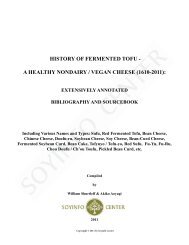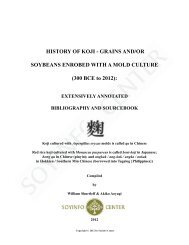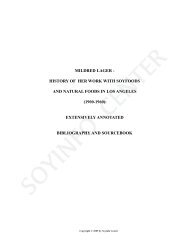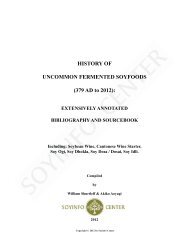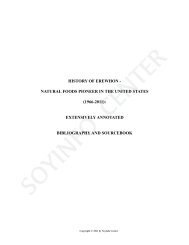history of soy yogurt, soy acidophilus milk and other ... - SoyInfo Center
history of soy yogurt, soy acidophilus milk and other ... - SoyInfo Center
history of soy yogurt, soy acidophilus milk and other ... - SoyInfo Center
You also want an ePaper? Increase the reach of your titles
YUMPU automatically turns print PDFs into web optimized ePapers that Google loves.
sure that Trader Joe sold the product before it was sold as<br />
WholeSoy. Ted made Creamy Cultured Soy once a week at<br />
the Morningstar plant in Fullerton. That went on for more<br />
than 18 months, until late 1999 or early 2000 when he moved<br />
to Super Store Industries in Turlock.<br />
Here is some background: Ted had his formulations<br />
from Sweden. Ted bought <strong>soy</strong>base from Raj Gupta in<br />
Ontario. Canada, had it shipped to the Morningstar plant in<br />
Fullerton, California. For two years, Ted had been making<br />
Silk <strong>soy</strong><strong>milk</strong> at a Morningstar plant in Gustine, California,<br />
for White Wave in extended shelf life gable-top packaging.<br />
During that time he started research on cultured <strong>soy</strong> <strong>yogurt</strong>s<br />
at the Morningstar plant in Fullerton (near Los Angeles)<br />
because he “was going to sell these <strong>soy</strong> <strong>yogurt</strong>s to Steve<br />
Demos, who had this horrible tasting <strong>soy</strong> <strong>yogurt</strong> named<br />
Dairyless, which was made in Boulder, Colorado at Steve’s<br />
plant.” Ted did not make the <strong>soy</strong><strong>milk</strong> from which Dairyless<br />
<strong>soy</strong> <strong>yogurt</strong> was made. It was cultured, but then it was postpasteurized.<br />
“It was an ugly color <strong>and</strong> had a horrible taste.”<br />
Ted wanted to sell the <strong>soy</strong> <strong>yogurt</strong> he was developing at the<br />
Morningstar plant in Fullerton to Steve Demos <strong>of</strong> White<br />
Wave. Ted even gave Steve prices. Then suddenly Steve<br />
left Ted <strong>and</strong> WholeSoy with $320,000 in unpaid invoices.<br />
Wondering what to do next, Ted realized that he had this<br />
nice new <strong>soy</strong> <strong>yogurt</strong>. He was selling <strong>soy</strong><strong>milk</strong> through Gary<br />
Stein to Trader Joe’s. Ted had a contract with Steve Demos<br />
which prohibited Ted from selling directly to Trader Joe’s.<br />
Gary Stein formulated his own <strong>soy</strong><strong>milk</strong>, using Ted’s <strong>soy</strong>base,<br />
making in Gustine <strong>and</strong> selling to Trader Joe’s. Ted got half<br />
<strong>of</strong> the revenue. It was through Gary Stein that Ted sold<br />
his <strong>yogurt</strong> to Trader Joe’s in May or June <strong>of</strong> 1998. “At the<br />
time we launched, Steve Demos was selling White Wave<br />
Dairyless [<strong>soy</strong> <strong>yogurt</strong>] all over the United States. In 14<br />
months (according to the SPINS report) sales <strong>of</strong> Creamy<br />
Cultured Soy passed those <strong>of</strong> White Wave Dairyless. We’ve<br />
never lost that fi rst place position.”<br />
1156. CaliforniaCare News (Blue Cross <strong>of</strong> California). 1998.<br />
I’m <strong>soy</strong> excited: It’s not just t<strong>of</strong>u anymore. Summer.<br />
• Summary: “Soy foods come from the <strong>soy</strong>bean.” They are<br />
turning up everywhere in many forms: Vegetable oil, <strong>soy</strong><br />
fl our, “t<strong>of</strong>u (<strong>soy</strong>bean curd), <strong>soy</strong>nut butter–a peanut butter<br />
alternative that’s lower in fat, <strong>soy</strong> <strong>milk</strong>, <strong>yogurt</strong>, cheese,<br />
<strong>and</strong> frozen desserts (good dairy substitutes for the lactose<br />
intolerant), meat substitutes, such as <strong>soy</strong> burgers <strong>and</strong> <strong>soy</strong> hot<br />
dogs (especially good for those trying to cut down on red<br />
meat).<br />
“A healthy choice: Many <strong>soy</strong> foods are high in protein.<br />
Two exceptions are <strong>soy</strong>bean oil, which is high in fat, <strong>and</strong> <strong>soy</strong><br />
sauce, which is high in sodium.<br />
“Soybeans also contain a chemical that is similar to the<br />
female hormone estrogen. Researchers say this chemical<br />
may help prevent <strong>and</strong> treat some cancers, heart disease, <strong>and</strong><br />
osteoporosis. It can also relieve the hot fl ashes associated<br />
HISTORY OF SOY YOGURT & CULTURED SOYMILK 443<br />
© Copyright Soyinfo <strong>Center</strong> 2012<br />
with menopause.”<br />
To learn more, call the United Soybean Board at<br />
1-800-Talk-Soy (825-5769).<br />
A color illustration (cartoon) shows a group <strong>of</strong> singing<br />
<strong>soy</strong> products: green vegetable <strong>soy</strong>beans in the pod, <strong>soy</strong><br />
cheese, <strong>soy</strong> fl our, <strong>and</strong> a <strong>soy</strong> hot dog in a bun. Address: 21555<br />
Oxnard St., Woodl<strong>and</strong> Hills, California 91367.<br />
1157. Galeaz, Kim. 1998. Build on better health with<br />
<strong>soy</strong>food guide pyramid. Soy Connection (The) (Jefferson<br />
City, Missouri) 6(3):4-5. Summer. [4 ref]<br />
• Summary: Page 4 shows the full-page “Daily Soyfood<br />
Guide Pyramid” containing six different food groups. Page 5<br />
describes how <strong>soy</strong>foods can be used in each group, including<br />
<strong>soy</strong> fl our, green <strong>soy</strong>beans, <strong>soy</strong><strong>milk</strong>, <strong>soy</strong> cheese, <strong>soy</strong> <strong>yogurt</strong>,<br />
t<strong>of</strong>u, meat alternatives (incl. <strong>soy</strong> burgers), roasted <strong>soy</strong>nuts,<br />
<strong>soy</strong>nut butter, <strong>and</strong> <strong>soy</strong> oil. Address: RD.<br />
1158. ProSoya Foods Incorporated. 1998. Manufacturer <strong>of</strong><br />
superior <strong>soy</strong>foods products (Ad). Soya & Oilseed Bluebook<br />
1999. p. 102.<br />
• Summary: This one-third-page black-<strong>and</strong>-white ad shows<br />
4 small aseptic cartons <strong>and</strong> four large gable-top cartons <strong>of</strong><br />
ProSoya SoNice organic <strong>soy</strong> beverage, plus fi ve cups <strong>of</strong><br />
ProSoya SoNice Yogurt. The <strong>soy</strong><strong>milk</strong> comes in natural,<br />
original, vanilla, chocolate & cappuccino (fresh & UHT<br />
packages). The <strong>soy</strong> <strong>yogurt</strong> comes in vanilla, strawberry,<br />
fi eldberry, raspberry, <strong>and</strong> black cherry. The company’s basic<br />
listing is on p. 143 <strong>of</strong> the Bluebook. See also ProSoya Inc.<br />
at 5310 Canotek Rd. #2, Ottawa, Ontario K1J 9N5, Canada.<br />
Address: 15350 56th Ave., Surrey (Vancouver), British<br />
Columbia, Canada V3S 8E7. Phone: (604) 576-8038.<br />
1159. Harrigan, Brian. 1998. ProSoya Inc. <strong>and</strong> International<br />
ProSoya Corp. (Interview). SoyaScan Notes. Oct. 15.<br />
Conducted by William Shurtleff <strong>of</strong> Soyfoods <strong>Center</strong>.<br />
• Summary: ProSoya Inc. <strong>and</strong> International ProSoya Corp.<br />
(IPC) are defi nitely two separate organizations; each is very<br />
different in its activities <strong>and</strong> philosophy. IPC was not created<br />
out <strong>of</strong> ProSoya, but rather as a separate entity with different<br />
owners to license ProSoya’s large-scale <strong>soy</strong><strong>milk</strong> technology.<br />
This relationship as licensee still exists. IPC does not make<br />
equipment or sell equipment worldwide; they make <strong>soy</strong><br />
products using ProSoya’s technology. ProSoya has some<br />
ownership in IPC <strong>and</strong> they have a very small ownership in<br />
ProSoya Inc. People do associate these two companies, not<br />
realizing that they are totally separate. This confusion (<strong>and</strong><br />
some things that people from IPC have said <strong>and</strong> done) has<br />
caused ProSoya quite a few problems.<br />
ProSoya does not presently make any <strong>soy</strong>food products.<br />
The plant on Canotek Road (in Gloucester, near Ottawa),<br />
where they used to make some products <strong>and</strong> have their<br />
<strong>of</strong>fi ces, was originally used solely for R&B, but it exp<strong>and</strong>ed<br />
so much that it eventually also became a commercial





